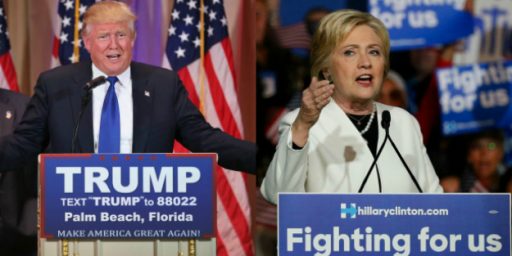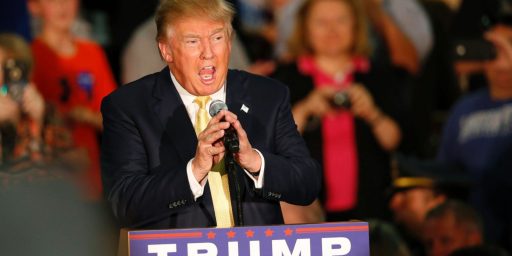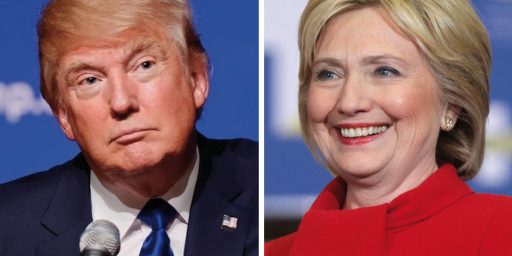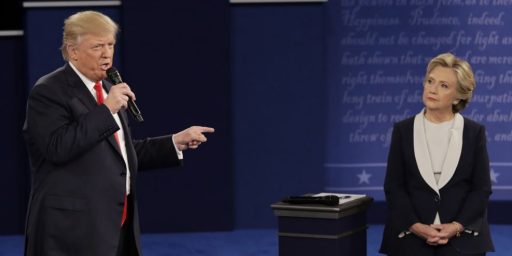Some Poll Observations
Some musings on the RCP average and such.
 In scrolling down the RCP list of presidential polls, I am struck by two things.
In scrolling down the RCP list of presidential polls, I am struck by two things.
First, as of today, the gap in the average is Clinton +4.6%. How does this compare to the same day for previous RCP averages?* Here they are:
2004: Bush +2.6%
2008: Obama +6.0% (and importantly, Obama was at 49.9%–i.e., almost 50% and 10/29/08 was a slight dip for him)
2012: Obama +0.8%
So, the current Clinton lead is a much larger gap than was the case in the polls in 2004 and 2012 and is, in fact, closer to 2008 than either of the other two cycles for which we have this information.** Still, the relative closeness of the national numbers (the EC projection is far less close) underscores, to a degree, something I mused about earlier this month: This Election May Not be as Weird as we Think. That is to say the economy is in moderately fair shape (but not booming) and the incumbent president is pretty popular. As such, that the party of the incumbent president is ahead is not especially surprising. Likewise, given historical trends in terms of the same party retaining the White House for three terms, and the fact that the economy is not booming, means that it is not surprising that the out of power party is competitive. And, yes, a better candidate would have been more competitive, but I am not sure if we wouldn’t still be seeing a Clinton lead at this point if one of the other GOP candidates had been nominated, but just a smaller margin.
All of this does continue to feed the question as whether candidate quality (broadly defined) matters as much as we often think it does. This is especially true in an are of highly polarized parties. That is not to say that Trump isn’t a terrible candidate, he is. And I do not even mean that in terms of what he says, per se, but in the sense that he lacks experience, clearly does not fully understand how to run a campaign, and is not the type of candidate likely to appeal to voters outside his base. Further, he has alienated some members of his own party. I suspect that part of the reason the polling looks different for 2016 in comparison to 2012 is candidate quality (although Clinton has her own issues in that area), although I will leave it to those who specifically study such things to determine how much fundamentals, such as the economy, help explain that difference. (There is also the question as to whether partisan polarization should change previous models, since it seems that voters are less likely to swing from one party to the other regardless of the fundamentals).
To tease out the basic point about candidate quality: if Trump loses within normal parameters, it will raise the question of whether the quality of his candidacy was really more important than the fundamentals. It would not be all that unusual for a generic Republican to lose to a generic Democrat by a few points given current conditions. In many ways that is exactly how the race is shaping up. Now, if Trump loses the national vote very badly, and loses, say Arizona and Utah in the process, then we have a different discussion. I am mostly just musing in public as to whether what we are seeing here in the last 10ish days is not just fairly normal partisan identification taking hold, since most of the tightening in the polls appears to be people who usually vote Republicans finally deciding that they will, in fact, vote Republican this election. That is: partisan ID beating out concerns over candidate quality.
As Nate Silver observed earlier in the week:
Trump’s share of the vote has increased, as he’s picked up undecided and third-party voters, probably as the result of Republicans’ returning home after a disastrous series of weeks for Trump this month. Clinton, however, is at least holding steady and probably also improving her own numbers somewhat.
[…]
Something else we’re relatively certain about is that Trump’s gains are partly the result of Republicans returning home to his campaign. One piece of evidence comes from Gallup’s tracking of candidate favorables: Trump’s favorable rating among Republicans has improved from 64 percent to 71 percent over the past week. But his favorability numbers with the broader electorate are up only slightly, from 31 percent to 34 percent. That suggests that Trump’s gains have come principally among Republicans.
Second, the other striking thing is that if you scroll down the RCP list, the only poll that shows a Trump lead over time is the LA Times/USC poll. For info on that poll, which is currently at +2 Trump. For info on that poll, I give you dueling Nates:
Nate Cohn at the NYT: How One 19-Year-Old Illinois Man Is Distorting National Polling Averages
Nate Silver: Election Update: Leave The LA Times Poll Alone!
I agree with Cohn that the poll in question has an odd sampling approach. I also agree with Silver that there is no need to litigate a specific poll. Still, it is striking to note that the only poll giving Trump an edge is an outlier in its method. I will hasten to add that yes, I also automatically have doubt about polls that put Clinton up by double-digits (although I am not sure that there is one that is as much an outlier in that direction that I would put in the same class as the LAT poll).
Really, the issues is this: either the LAT methodology is out of whack or all the others are. Both scenarios are possible, but I suspect that the latter is more probable. I would consider the race more of a toss up if many polls widely disagreed on who was in the lead.
—
*After I wrote this it occurred to me that I should have compared 10/28 since 10/29 is not over yet but it didn’t seem necessary, so I stuck with these numbers.
**These are not, by the way, perfectly comparable numbers since the make up of the RCP average is not identical cycle to cycle.





But, but…secret Trump voters!
I’m sure most have seen this, but it’s the Obama internal polling versus Gallup’s in 2012. The point here isn’t that internal polling was better than public polling – it usually is. It’s how little change there was during the election and how close the ultimate result was to the polling in June.
People don’t really change their mind much in presidential elections, it seems. It should be little surprise that this year is not an exception.
When the ABC poll goes from Hillary +12 to Hillary +2 in four days, I think it’s correct to say that was an outlier at least on the order of the LAT. And it’s worth noting that the RCP average was quite a bit off in 2012, as Obama wound up winning by almost 4 points.
And the suggestion that candidates don’t matter seems disproved, at least in this case, by statistical and anecdotal evidence. Hillary’s approval ratings are terrible and have been for a long time. To believe that wouldn’t matter against an opponent with better approval ratings or that Hillary’s would be more popular if she were running against someone other than Trump seems like wishful thinking.
Mike
@Surreal American:
Agreed… that has gotten a lot of press lately.
Trump is being defined as a guilty pleasure… Sure, I’m a racist, sexist, nationalist, likely evangelical… and I have learned to keep my comments to myself (except on the internet)… But come Nov 8th, I can let my freak flag fly and vote for Trump. Right?
Except no.
Are there some “Secret Trump voters”? Likely.
But are there even more “secret Clinton voters”? Even MORE likely.
Women who are so fed up on what they have heard that they will vote for the Hillary, even though they keep watching Fox News with their husband and talk GOP shit at the neighborhood coffee klatch.
But are either of these enough to swing the election one way or another?
No. Not by themselves.
I am far more concerned about those who (for whatever reason) will vote third party. I feel that those independents and millennials will have a greater impact by putting their vote in the virtual “none of the above” candidate.
So: That’s the issue.
Being an ex-Detroiter, I never expected that I would see a black president in my lifetime. And BAM, not only elected, but will be a president we will look back on as one of the top 15 (if not top 10).
But to talk to my two nieces (mid 20’s) and to listen to them being undecided if they will vote for Hillary… just leaves me completely dumbfounded.
The “both sides do it” scale is just way out of proportion. And, I fear, the average person has lost the ability to weigh the difference.
@MBunge: if you look at the ABC poll ovetr tme you see fluctuations. As such, the fact that it co to use to fluctuate shows a certain level of consistency. There is no poll that is consistently way up for HRC.
In regards to your observation about candidates–that’s not how analysis works. You can’t just assert a counter factual and as if that proves anything. Indeed, we really can’t make any final claims about this until the election is done.
Beyond that, I think you are missing my basic point about this.
That’s hardly surprising…he misses many basic points…
The LAT thing is interesting in a Heisenberg Uncertainty kind of way. As I understand it we are getting periodic updates from a group of folks who began by stating a position and are then tracked to see whether they change their minds. This is nuts, of course, since once a person is ‘on the record’ the rigidity of their position increases dramatically. The realization that they will be polled and re-polled has its own distorting effect. Interesting, not likely not to be predictive, but that’s how science works: you have to be willing to risk failure.
Now that I’m retired, I get all these sure fire business ideas. Based on the way people react to polls, I think that a good news weather report agency would be easy money. We would always predict sunny skies, and people would love us. No negativism from my weather agency, our agency would be guaranteed to leave you with a smile.
If anyone knows how to make one of those go fund me things work, let me know.
@Steven L. Taylor:
1. Proposing counterfactuals without regard for facts and hypotheticals without regard for common sense is just mental masturbation. It is a fact that in this reality, Hillary’s approval rating went underwater months before the Iowa Caucses and stayed there ever since. Since it’s hard to imagine another Republican candidate would have had approval ratings as bad as Trump, though Cruz might have done it, any alternative scenario involves an unpopular Hillary and an opponent more popular than the one she faces now. Unless you can argue that running against a less despised opponent would, by some idiotic transitive property, make Hillary less unpopular as well, it seems reasonable to expect more than douchey hand waving to justify the counter-intuitive proposal that replacing Trump with a much less toxic candidate would have no effect on the race.
2. You clearly got a bee in your bonnet about polls from somewhere, though I haven’t a clue from where. If you want to start arguing for the importance of structural factors over campaign events, you might want to look back at Bush/Gore and explain what structural factors overcame the eight years of peace and prosperity the Democrats had on their side. Or are you just cranky because you thought for a week that this was finally going to become the blowout you always expected and have now turned out to be wrong twice on the same subject?
Mike
@Slugger: And yet Nate Silver tells us that real weather forecasters, at least commercial ones like TV, have a significant “wet” bias. One rained out picnic outweighs any number of feel good sunny days.
@MBunge: I don’t recall ever stating this would be a blowout. Indeed, the whole point of constantly noting that the election may not end up being all that weird after all is to underscore that it probably won’t be a blow-out. If it is a blow-out that would mean that candidate quality really came into play. Again, it seems like you don’t really understand what I am saying. I would be happy to try and rectify that, but I get dthe impression that understanding is not your goal.
Also, I am not sure how talking about the polls, and taking them seriously, is getting “a bee in my bonnet.” Indeed, you are the one who seems to want to use your own notions of what is going on rather than looking at the numbers.
I still think Clinton will win. The electoral college pathway for Clinton is far, far easier than for Trump. But that has always been true for the Democrats (and that is part of the point). This is, in fact, what the polls are showing. To assert otherwise is to be engaging in speculation (indeed, one might say mental mastrubation).
Beyond that, as usual, I not sure as to exactly what your point is.
@Steven L. Taylor: sorry about the autocorrect weirdness in the syntax. I shouldn’t have tried to reply on the sideline of a soccer game.
Bunge is absolutely obsessed with the ABC polling; the way that he goes on about it, there must not be any other polls in Bungeland. Combine OCD with cloudy thinking, and that’s what happens.
The 2012 election result was largely within the margins of error of the last polls used by Real Clear Politics. Trying to use polls to predict exact numbers is a fool’s errand and reflects a basic ignorance of how statistical sampling and forecasting work. Nobody is actually expecting a given poll to get the exact vote within one-tenth of a percent, and it’s only dumb luck if it does happen.
@Pch101: The weird thing (or one of the weird things) about his focus on the ABC poll: I don’t think I have ever directly cited it and even if I did, it would never have been to single it out as better than the other polls.
Indeed, in the post above I specifically state:
It is as if MBunge doesn’t actually read what I write before he starts ranting…
I don’t believe there is a hidden Trump voter for the general election, though it existed in the primaries. As I travel my little part of NH, I’m seeing lots of Trump signs and few Clinton signs. Interestingly the Trump signs are appearing in yards that I don’t remember having political adv in prior elections and the neighbors who featured Romney or McCain signs in the past have nothing up.
None of this anecdotal sign observation, jives with polling which has the women’s trinity, Hil, Maggie and Sharon up in each of their races.
Correction Carol, just an indication of how forgettable a candidate and congress critter Shea Porter is.
@Steven L. Taylor: His point is that if (when?) Trump wins or this whole thing goes into the House for resolution, we’re going to be sorry that we didn’t listen to…
well, me in fact. I was saying that I was glad that Hillary wasn’t going to run as early as when she left State and encouraged her to hold to her word.
@Pch101:
Margin of error is naturally smaller in polling averages than in individual polls. There was more going on in RCP’s misfire that year. (I should note, as an aside, that HuffPost, FiveThirtyEight, and Sam Wang also underestimated Obama’s margin of victory in the popular vote, though not quite as widely as RCP did.) There’s evidence that minorities were underrepresented in the polls. That factor was also a major part of the reason for the disparity in the 2010 Senate race between Harry Reid and Sharron Angle, one of the big polling upsets of modern times.
Of course if Trump has a lot of supporters who are the sorts of voters who were less likely to vote in previous elections, that could lead him to do better than the polls suggest (or at least to neutralize the countervailing effect on Clinton’s side). I’ve been skeptical of this theory, but I’m not ready to discount it just yet.
Again, in 2012, by election day, conservatives had convinced themselves that most polls were wrong, that Mitt Romney was going to win.
Me? I will stay with Nate Silver’s analysis, and with poll aggregators, until they are proven wrong.
@Sleeping Dog:
Yeah, I was really hoping Chris Pappas would run for that seat…he’s young though, maybe in the future.